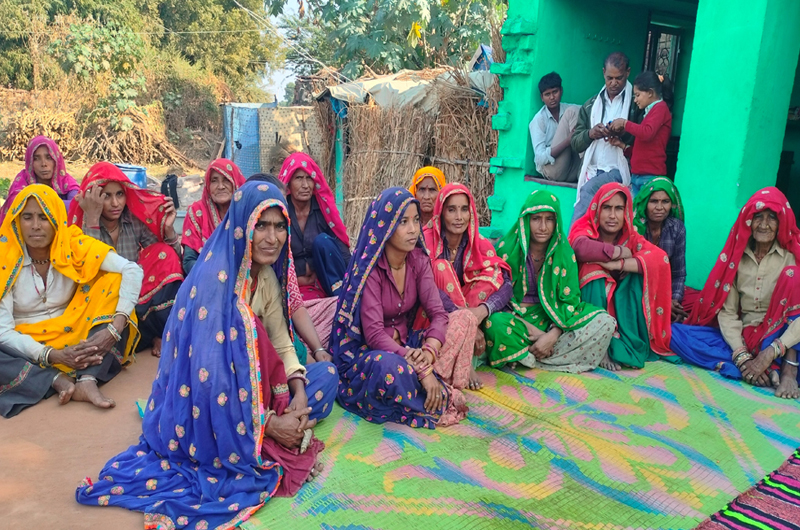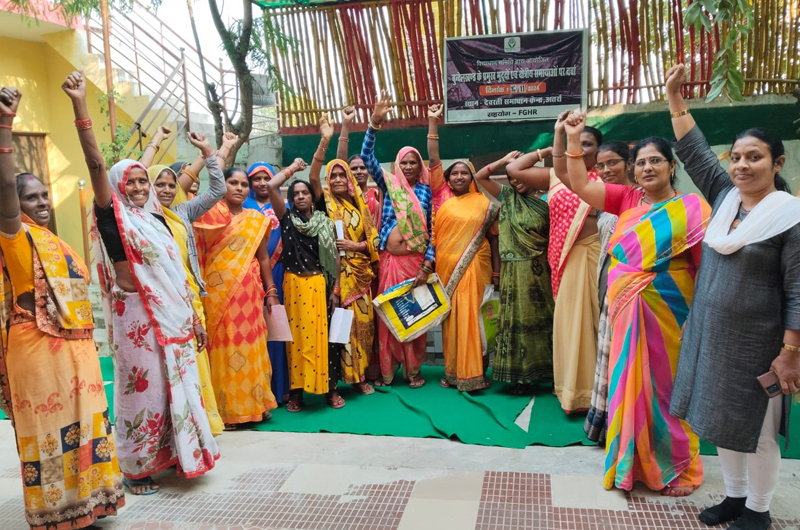Chingari, working for women’s welfare, has been making a difference in remote villages in Uttar Pradesh. The organisation has been working relentlessly for the empowerment of women, protection of women and girls from violence, injustice and discrimination, and for better implementation of various protective laws and welfare schemes. Many women who have been helped by Chingari are keen to help fellow sufferers combat injustice and pain. Bharat Dogra gives an overview of their efforts. In the shorter accompanying piece, he says women’s voices may get lost when old and then patriarchal habits are blindly followed
Pramila (name changed), endured domestic violence and insults for many years of her married life. When she could take it no more, she came back to her native village, Magaura, in Uttar Pradesh’s Banda District, along with her three children (two daughters and a son) to live with her parents. The woman, who holds a postgraduate degree in Hindi Literature, contacted Chingari (meaning Spark), a women’s organisation and, during counseling, realised that she had certain legal rights.
After Pramila filed complaints against the violence and injustice inflicted on her, her husband and his father finally expressed regret for their actions and agreed to compensate her with a monthly amount of Rs 12,500. At the time of writing, she had received two such monthly instalments. Pramila now has a new confidence in her ability to support herself and her children. What is more, she is very keen to help other women in similar situations, and she is getting involved with Chingari. Many women who have been helped by Chingari are keen to help fellow sufferers combat injustice and pain.
Meena (name changed) of Malhara Village was returning a after answering nature’s call in the open fields when she was waylaid by a local antisocial element who tried to molest her. When she raised an alarm, he ran away, but Meena and her father went to the police station to register a complaint. As they were Dalits, they faced many problems initially. The aggrieved family then approached Chingari, and the women activists there took up the matter with police officials. After their intervention, the complaint was registered and the accused was arrested.
Kammo of Naugawan Village had a different problem. Her husband had been ailing for some time and she had been trying to build a house during the difficult situation. An unscrupulous person arbitrarily demanded Rs 20,000 from her and when she could not pay, the construction work was stopped. She approached the police, but was ignored. So she turned to Chingari, who initiated legal action against the accused and others acting in collusion with him. The pressure on Kammo eased and she was able to complete the house construction. She is now living there with her family.
In Tirra Ka Purva hamlet in Atarra Gramin, the anganwadi (nursery) was not functioning properly and distribution of the nutritious meals was not being carried out well. Santoshi, a Chingari activist, mobilised local people and filed complaints with the relevant authorities. Soon, corrective action was taken and the anganwadi’s functioning improved. A similar situation was set right in Shabdapurva hamlet.
Chingari has been working relentlessly for the empowerment of women, protection of women and girls from violence, injustice and discrimination, and for better implementation of various protective laws and welfare schemes. Despite being primarily an organisation of women, it does not exclude the active participation and cooperation of men who agree with its aims and aspirations and also contribute to its various struggles. Issues which are not related to just women but are important for the entire community (for example, better functioning of schools or mid-day meals schemes) are also taken up by Chingari.
In Banda District, Chingari is active in Naraini, Mahuwa and Bisanda Blocks and has about 10,000 members spread over about 90 villages. It works in cooperation with Vidya Dham Samiti, which has similar values and goals. Chingari chaupals or community gatherings are organised once a month to discuss various current incidents and problems. Women victims of violence and injustice attend these chaupals regularly and, after listening to their problems, the future course of action, including legal support and meetings with various officials, are charted out.
Such support is particularly important for those women who come from poor and vulnerable households. At present, Chingari is assisting over 50 such women. Their efforts have resulted in bringing much-needed relief to a large number of women victims, and have also helped reduce violence against women in a region which is prone to such problems, although a lot remains to be done in this regard.
Greater involvement of women boosts developmental activity
It has been seen time and again that when women get a more significant role in development initiatives and have more say in deciding priorities, development initiatives are strengthened. This is because women have higher commitment to sustainability and to meeting the basic needs of their families, and decide their priorities on this basis. An ongoing development initiative by leading voluntary organisation SRIJAN in Karauli District of Rajasthan is a prime example of this.
A correction was made midway through the initiative to give importance to the mobilisation and involvement of rural women, and the results are palpable in villages like Jagdharpura where women’s groups are very active now. Even women in very difficult circumstances are coming forward to contribute to development initiatives. Bilasi of Rawatpura Village lost her husband at an early age, leaving her with the responsibility of singlehandedly bringing up six children, five of them girls. But she is active in various development initiatives in her village, inspiring and motivating other women too.

Drinking water availability is a major issue, both here and in some other villages, particularly in acute summer. As women in Rawatpura stated, May and June can be intolerably hot and they have to go a long way to fetch water, sometimes having to leave home as early as 4 am to ensure that they can get at least a part of the scarce water left in wells. This is the situation despite the government prioritising making tap water available to all households through its Jal Jeevan Mission. Villages like Rawatpura and Jagdharpura need solutions for local issues hindering drinking water availability, not centralised efforts, and there is considerable room for cooperation among social activists, villagers and government authorities to find and implement the most workable solutions.
Women are also keen to prioritise checking all forms of violence against the frailer sex, and to promote social reform work such as checking the rapid spread of gutka (chewing tobacco preparation) and smokeless tobacco. Issues relating to health and nutrition are also important to women. Conversations with them revealed that they value the spread of natural farming, even if it does not increase yield, because of the health and nutrition benefits it brings to their families. In villages where migrant workers go to distant places frequently, the close involvement of women in development initiatives is specially important to maintain continuity. SRIJAN’s efforts to increase the involvement of women in developmental initiatives in Karauli is a good example to follow, because there’s always the danger of women’s concerns and priorities being given inadequate attention when old habits are followed as a matter of course.
(The writer is a senior freelance journalist and author who has been associated with several social movements and initiatives. He lives in New Delhi.)



 from Webdoux
from Webdoux